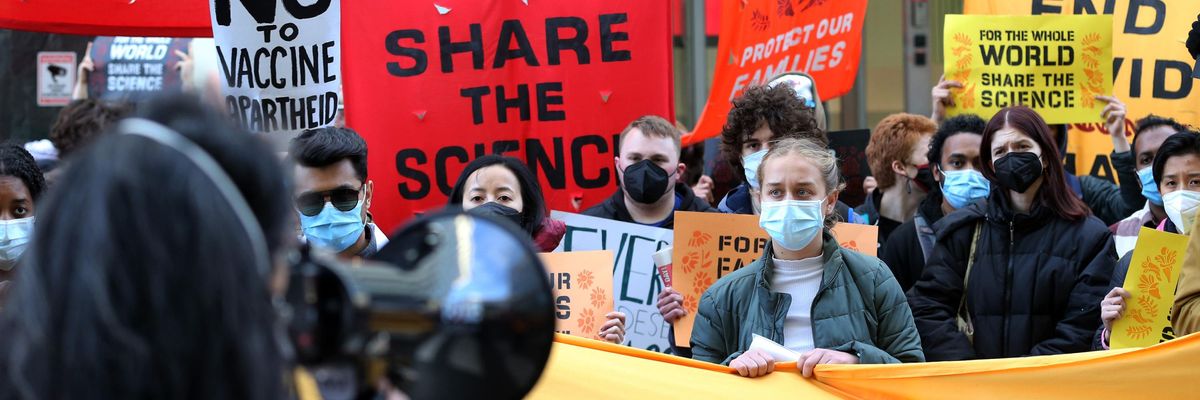As Moderna reported higher-than-expected revenue driven entirely by sales of its publicly funded Covid-19 vaccine, health equity campaigners on Wednesday renewed calls for pharmaceutical companies to waive patent protections in order to share their lifesaving technology with developing countries.
"The company has been allowed to make huge profits while doing next to nothing to ensure equitable access for people in lower-income countries."
Cambridge, Massachusetts-based Moderna reported $4.7 billion in second-quarter sales--a 9% increase over the same period last year--despite taking a nearly half-billion-dollar hit for write-downs on expired or soon-to-expire vaccine doses. Nearly all of the company's revenue came from sales of its Covid-19 vaccine, its only product on the market--and one whose development was funded entirely by U.S. taxpayers and contributions from private donors.
CNBCreports Moderna is also sitting atop an $18 billion cash pile, and intends to buy back $3 billion worth of its own stock. Furthermore, the company last week announced a $1.74 billion agreement with the U.S. government to supply up to 300 million doses of an updated Covid-19 vaccine for use against the omicron BA.4 and BA.5 subvariants.
"Moderna's Covid-19 vaccine was developed totally by public funding. Yet the company has been allowed to make huge profits while doing next to nothing to ensure equitable access for people in lower-income countries," Mohga Kamal-Yanni, policy co-lead for the People's Vaccine Alliance, said Wednesday. "For the company's newly created billionaires, this pandemic has been a lucrative smash-and-grab operation."
Among the at least nine new billionaires created by pandemic-related capitalism are Moderna CEO Stephane Bancel, Moderna co-founder Noubar Afeyan, and immunologist and Moderna founding investor Timothy Springer.
Moderna has been widely criticized for selling its vaccines mostly to wealthier countries, even as billions of people in the Global South lack access to the lifesaving inoculations over two and a half years into the pandemic. The company has also come under fire for massively overcharging for its vaccine doses.
Like other pharmaceutical companies and almost all wealthy nations, Moderna long opposed a waiver for parts of the Agreement on Trade-Related Aspects of Intellectual Property Rights (TRIPS), a proposal by India and South Africa--supported by more than 100 nations--that would lift some patent protections to allow developing countries to produce and distribute vaccines. A narrowly crafted World Trade Organization deal ostensibly meant to address vaccine inequities was condemned as a "sham" by activists earlier this year.
Moderna's pledge last year to build a Covid-19 manufacturing facility in Africa was dismissed by activists as largely a public relations stunt meant to thwart patent waiver efforts and marginalize a World Health Organization (WHO) messenger RNA (mRNA) technology transfer initiative in South Africa.
"Now Moderna is threatening the world's response to future pandemics," Kamal-Yanni said. "Broad patents filed by the company in South Africa could derail a WHO and African Union project aimed at responding to global health crises by rolling out mRNA vaccines made in low- and middle-income countries."
On Wednesday, the Medecins Sans Frontieres (MSF) Access Campaign noted that more than 100 manufacturers in low- to middle-income countries "have been identified with potential to produce mRNA vaccines," while urging Moderna to share its vaccine technology "for Covid and for the future."
Alain Alsalhani, vaccines pharmacist at MSF's Access Campaign, tweeted that "mRNA technology has important potential to beat back not just Covid but other epidemics. We should refuse to allow half of the world to get served first while the rest of the world looks on empty-handed."
Messenger RNA vaccines--which work by instructing cells to produce recognizable copies of viral protein against which the immune system can develop antibodies--are simpler and faster to make than alternatives, and can be adapted to combat not only new Covid-19 variants but also other diseases including HIV, malaria, and tuberculosis. Moderna and others are also exploring potential mRNA monkeypox vaccines.
Related Content
Activists Disrupt Global AIDS Conference to Demand Action on Monkeypox
Jessica Corbett
"In the Covid-19 pandemic, world leaders have allowed pharmaceutical companies to place extraordinary profits ahead of saving lives," said Kamal-Yanni. "And we have seen the huge impact on life and livelihoods in lower-income countries that is far more than in rich countries. Unless we change course, the world's response to a crisis like monkeypox will be just as brutally unequal."


